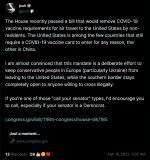The district court correctly concluded Mr. Greer “sufficiently alleged” direct copyright infringement by a third party.”
Mr. Greer’s complaint alleged copyright violations related to his book and music. Mr. Greer provided the registration numbers and effective dates for both. He included certificates from the United States Register of Copyrights. And Mr. Moon and Kiwi Farms do not dispute these copyrights were validly registered and their certificates appropriately issued pursuant to 17 U.S.C. §§ 408–410.
Recall, the Copyright Act grants copyright holders like Mr. Greer the generally exclusive rights “to reproduce the copyrighted work in copies” and “to distribute copies . . . of the copyrighted work to the public . . . .” 17 U.S.C. § 106(1), (3). Usually, when a third party reproduces or distributes a copyrighted work without authorization, they infringe on the exclusive rights of a copyright holder under 17 U.S.C. § 501.
In his complaint, Mr. Greer alleged he discovered the book “had been illegally put onto Kiwi Farms” in January 2018. “Somebody,” he explained, “created a copy of [his] book and put it in a Google Drive that is accessible on Kiwi Farms.” The complaint also included allegations "[o]ther users on Kiwi Farms have created unauthorized audio recordings of” the book “and have put them on various sites.” Kiwi Farms, Mr. Greer continued, “has links to these audio recordings.” As to the song, Mr. Greer alleged he found an “MP3 of his song was . . . on Kiwi Farms” in April 2019. A Kiwi Farms user posted the song with the comment “Enjoy this repetitive turd.” Another user commented, “Upload it here so no one accidentally gives [Mr. Greer] money.” The complaint also alleged “Mr. Moon’s users spread Greer’s song across different sites.”
Based on the complaint, we conclude, like the district court, Mr. Greer plausibly alleged direct, third-party infringement of copyright under 17 U.S.C. § 501.10
- On appeal, Mr. Moon and Kiwi Farms suggest the copyright infringement here may have been “for purposes such as criticism and/or comment” and is thus protected under the “fair use” limitation of 17 U.S.C. § 107. Appellees Br. at 33. The paragraph discussion identifies the four factors in 17 U.S.C. § 107 but fails to explain what those factors are or why they apply here. We do not address this passing mention of a novel issue. See Day v. SkyWest Airlines, 45 F.4th 1181, 1192 (10th Cir. 2022) (declining “to consider [a] newly raised, inadequately briefed, and analytically complex issue in the first instance on appeal”).
- In any case, Mr. Moon and Kiwi Farms did not plead the affirmative defense of fair use, and, “[a]s a general rule, a defendant waives an affirmative defense by failing to plead it.” Burke v. Regalado, 935 F.3d 960, 1040 (10th Cir. 2019) (citing Bentley v. Cleveland Cnty. Bd. of Cnty. Comm’rs, 41 F.3d 600, 604 (10th Cir. 1994)); see also Fed. R. Civ. P. 8(c) (explaining “a party must affirmatively state any avoidance or affirmative defense”).
- Perhaps to get around the bar of waiver, Mr. Moon and Kiwi Farms describe fair use as “more than an affirmative defense; the language of the statute makes it clear that fair use is not infringement at all.” Appellees Br. at 33 (citing 17 U.S.C. § 107). But we decline the invitation to transfigure fair use into an un-waivable defense. See Andy Warhol Found. for the Visual Arts, Inc. v. Goldsmith, 143 S. Ct. 1258, 1285 n.21 (2023) (explaining “fair use is an affirmative defense” and the party invoking it “bears the burden to justify its taking” of the protected work); id. at 1288 (Gorsuch, J., concurring) (discussing a party’s invocation of “the affirmative defense of ‘fair use’ to a claim of copyright infringement”).
The district court also concluded Mr. Greer “sufficiently alleged” “the defendant knew of the direct infringement.” Here, too, we
agree.
Mr. Greer’s takedown notices complied with 17 U.S.C. § 512(c)(3). A takedown notice under the DMCA needs to identify “the copyrighted work claimed to have been infringed” and “the material that is claimed to be infringing or to be the subject of infringing activity . . . .” 17 U.S.C.§ 512(c)(3)(A)(ii)–(iii). Here, Mr. Greer’s original email and DMCA notices identified the book and song protected by copyright, pointed to the locations on Kiwi Farms where these works were being copied and shared without authorization, and requested Mr. Moon, as site administrator, remove the infringing materials.
While Mr. Moon debated the merits and style of Mr. Greer’s takedown notices—claiming in emails the infringements were protected under fair use and mocking the use of a “template” for the DMCA request—the complaint sufficiently alleged that Mr. Moon knew of the alleged direct infringement.
For contributory liability to attach, the final Diversey prong requires a defendant to “cause” or “materially contribute to” third-parties’ direct infringement. Diversey, 738 F.3d at 1204. The Supreme Court has described “contributory infringers” as those who are “in a position to control the use of copyrighted works by others” and who “authorize[] the use without permission from the copyright owner.” Sony Corp., 464 U.S. at 437. As applied here, Mr. Greer was required to plausibly allege Mr. Moon and Kiwi Farms caused, materially contributed to, or authorized the direct infringement by Kiwi Farms users and other third parties of Mr. Greer’s book and song. We conclude he did so.
The district court correctly explained the Diversey factors and rightly identified the liberal pro se pleading standard. Nevertheless, it dismissed Mr. Greer’s contributory infringement claim after concluding, “[w]hat is missing is the Defendants’ intentionally causing, inducing, or materially contributing to the infringement.” “It is not enough,” the district court continued, “for a defendant to have merely ‘permitted’ the infringing material to remain on the website, without having ‘induc[ed] or encourage[ed]’ the initial infringement.” (citing Grokster, 545 U.S. at 930).
On appeal, Mr. Greer contends he “sufficiently pleaded factual allegations of inducement” and encouragement. Appellant Br. at 46–52. Mr. Moon and Kiwi Farms reply they simply “allow[ed] an infringing use to exist on their website” and so cannot be “liable for the actions of [their] users, even if [they] knew about the alleged infringement.” Appellees Br. at 35.12
We discern no error in the district court’s explanation that contributory liability requires more than “merely ‘permitting’ the infringing material to remain on the website.” And we conclude Kiwi Farms and Mr. Moon accurately state the law when they argue “a website owner or operator must do something other than allow an infringing use to exist on their website.” Appellees Br. at 35.
But these general principles of law are of little help here, where the record shows—and Mr. Greer’s complaint plausibly alleged—far more than “a failure to take affirmative steps to prevent infringement . . . .” Grokster, 545 U.S. at 939 n.12 (emphasis added
When Mr. Greer discovered the book had been copied and placed in a Google Drive on Kiwi Farms, he “sent Mr. Moon requests to have his book removed . . . .” Mr. Moon pointedly refused these requests. In fact, instead of honoring the requests, Mr. Moon posted his email exchange with Mr. Greer to Kiwi Farms, belittling Mr. Greer’s attempt to protect his copyrighted material without resort to litigation.
After the email request, Kiwi Farms users continued to upload audio recordings of Mr. Greer’s book, followed by digital copies of his song. When Mr. Greer discovered the song on Kiwi Farms, he sent Mr. Moon a takedown notice under the DMCA. Mr. Moon not only refused to follow the DMCA’s process for removal and protection of infringing copies, he “published [the] DMCA request onto [Kiwi Farms],” along with Mr. Greer’s “private contact information.” Mr. Moon then “emailed Greer . . . and derided him for using a template for his DMCA request” and confirmed “he would not be removing Greer’s copyrighted materials.” Following Mr. Moon’s mocking refusal to remove Mr. Greer’s book and his song, Kiwi Farms users “have continued to exploit Greer’s copyrighted material,” including two additional songs and a screenplay.
Construing the pro se complaint liberally and drawing all reasonable inferences in Mr. Greer’s favor, we find Mr. Moon’s alleged conduct to fit within our understanding of material contribution.13 Mr. Greer sent repeated requests to Mr. Moon, identifying the materials on which he held the copyright, as well as where and how his rights were being infringed. Mr. Moon not only expressly refused to remove the materials, he mockingly posted the correspondence to Kiwi Farms. Under the circumstances, this is not the passive behavior of one “merely permitting” infringing material to remain on his site. Rather, we conclude a reasonable inference from the facts alleged is that the reposting of the takedown notice, combined with the refusal to take down the infringing material, amounted to encouragement of Kiwi Farms users’ direct copyright infringement.
Mr. Greer’s complaint alleged Mr. Moon knew Kiwi Farms was an audience that had been infringing Mr. Greer’s copyrights and would happily continue to do so. Indeed, Kiwi Farms users had been uploading Mr. Greer’s copyrighted materials with the explicit goal of avoiding anyone “accidentally giv[ing] [Mr. Greer] money.” Further infringement followed—encouraged, and materially contributed to, by Mr. Moon. See Diversey, 738 F.3d at 1204. IV
We hold Mr. Greer has stated plausible claims of contributory copyright infringement against Mr. Moon and Kiwi Farms. The judgment of the district court is REVERSED and this case is REMANDED for further proceedings.




